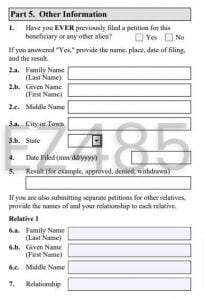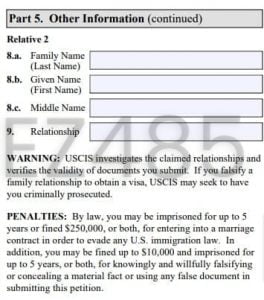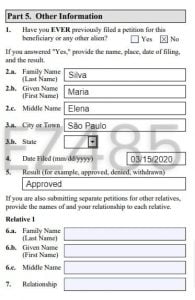Understanding “Other Information” in the I-130 Form Part 5
Introduction
The I-130 form, officially known as the Petition for Alien Relative, is a critical document in the realm of U.S. immigration. It serves as a petition filed by a U.S. citizen or a lawful permanent resident on behalf of a family member seeking to immigrate to the United States. The accuracy and completeness of this form are paramount in ensuring the legal and efficient processing of family-based immigration petitions. In this article, we’ll delve into a specific section of the I-130 form: Part 5, titled “Other Information.”
Section 1: Overview of Part 5
Part 5 of the I-130 form may seem like a mere collection of questions, but it plays a pivotal role in the immigration process. This section is designed to gather additional information about the petitioner, the beneficiary, and their history with previous immigration petitions. The questions in Part 5 are carefully crafted to provide immigration authorities with a comprehensive understanding of the petitioner’s background and relationship with the beneficiary.
While all sections of the I-130 form are important, Part 5, “Other Information,” stands out for its ability to uncover any previous petitions filed for the same beneficiary or other aliens. The questions in this section require transparency and accuracy in providing historical details. It is crucial to answer these questions truthfully, as any falsification could lead to severe consequences, including criminal prosecution.
In the following sections, we’ll dissect the questions in Part 5, offer an example of a completed form based on a fictional persona, and explore the penalties for providing false information in immigration petitions.
Section 2: Questions in Part 5


Part 5 of the I-130 form presents a series of questions, each designed to elicit specific information. Let’s explore these questions and understand their significance:
Question 1: Have you EVER previously filed a petition for this beneficiary or any other alien?
- This question seeks to determine if the petitioner has filed an immigration petition for the same beneficiary or any other alien before. It’s a straightforward “Yes” or “No” response.
- If the answer is “Yes,” the form requires the petitioner to provide the name, place, date of filing, and the result of the previous petition.
Questions 2-4: Beneficiary’s Personal Information
- Questions 2.a, 2.b, and 2.c request the beneficiary’s family name, given name, and middle name, respectively.
- Questions 3.a and 3.b ask for the beneficiary’s city or town and state.
- Question 4 calls for the date the previous petition was filed, in mm/dd/yyyy format.
- Question 5 seeks the result of the previous petition, such as whether it was approved, denied, or withdrawn.
Questions 6-9: Information on Other Relatives
- If you are also submitting separate petitions for other relatives, you need to provide the names and your relationship to each relative.
- Questions 6.a, 6.b, and 6.c request the family name, given name, and middle name of Relative 1, and question 7 seeks your relationship to Relative 1.
- Questions 8.a, 8.b, and 8.c ask for the same information for Relative 2, and question 9 pertains to your relationship with Relative 2.
As you can see, each question in Part 5 is designed to gather essential information for USCIS to evaluate the petitioner’s background and previous interactions with the immigration system.
Part 5 Example

To illustrate the practical application of Part 5, let’s create a fictional persona from Brazil who is completing the I-130 form. This example will demonstrate how to fill out the section accurately, ensuring that the edition date is visible at the bottom of the page.
Name: Maria da Silva
Question 1: No
Questions 2-4 (Beneficiary’s Information):
- 2.a. Family Name: Silva
- 2.b. Given Name: Maria
- 2.c. Middle Name: Elena
- 3.a. City or Town: São Paulo
- 3.b. State: Blank
- 4. Date Filed: 03/15/2020
- 5. Result: Approved
Maria da Silva is not filing petitions for any other relatives, so there is no need to provide information for Questions 6-9.
Edition Date: 07/20/21 (Ensure this date is visible at the bottom of the page.)
Penalties and Consequences
When it comes to filling out the I-130 form, honesty and accuracy are not just best practices; they are legal requirements. Providing false information on immigration petitions can have severe repercussions. It is imperative for petitioners to understand the penalties and consequences associated with fraud or falsification.
The Legal Consequences:
Under U.S. immigration law, it is a federal offense to falsify information on immigration forms, including the I-130. The penalties for such actions can be harsh and include both criminal and financial consequences.
Imprisonment: Individuals who knowingly provide false information on immigration petitions may face imprisonment for up to five years. This is a significant legal penalty that can result in the loss of personal freedom.
Fines: In addition to potential imprisonment, petitioners may also be fined up to $250,000 for entering into a marriage contract in order to evade any U.S. immigration law. This fine applies to those who engage in fraudulent marriages to gain immigration benefits.
Additional Fines: Petitioners who knowingly and willfully falsify or conceal a material fact or use false documents in submitting their petition may be subject to further fines of up to $10,000.
The Importance of Honesty:
Understanding these penalties underscores the importance of providing accurate and truthful information on the I-130 form. It is crucial to disclose any previous petitions and relationships accurately. USCIS takes these matters seriously and actively investigates the claimed relationships and the validity of submitted documents. If it is determined that a petitioner has provided false information, USCIS may seek criminal prosecution.
This is not meant to discourage legitimate petitioners but to emphasize the significance of honesty in the immigration process. For those with genuine family relationships and intentions to reunite with their loved ones in the United States, adhering to the truth is the safest and most ethical course of action.

